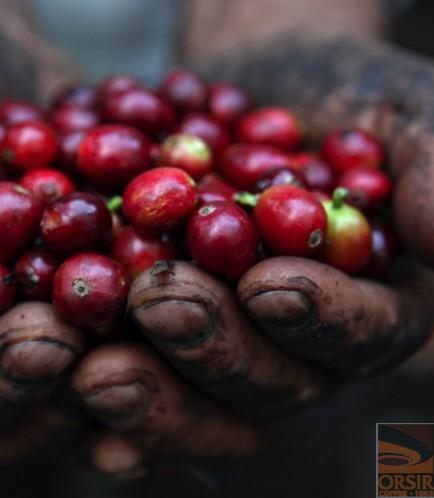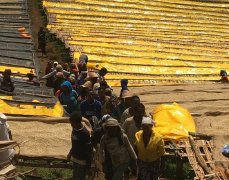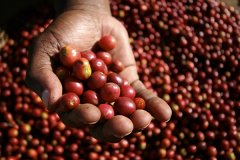Kenya Kasawa small Farmers Cooperative Information introduction Kenya AB is not worse than Kenya AA

For professional baristas, please follow the coffee workshop (Wechat official account cafe_style)
Kenya AB Kathakwa
In Kenya in 2017, production continued to decline, raw bean prices soared, and there were almost no winners in 2017!
During the main production season at the beginning of the year, the team settled in Kenya for about a week, continued to test more than 100 batches of samples, and finally selected 12 batches for introduction. This selected AB is from Kathakwa.
The Casawa farm, located in Embu County, was established in 1964 as a small primary and village cooperative under the Kibugu Valley Cooperative (FCS). Kasawa's farmers come from the villages of Kibugu and Nguviu. The current farm manager is John Njue Kamwengu, and John will hire several more temporary workers to assist him in his busy quality control and processing work.
The annual rainfall in Casawa is about 1500 mm, and the main rainy season is from March to May. October to December is the rainy season, which is also the distinction between the two major production seasons. November to January is the main harvest season, and May to June is the secondary harvest season. The average annual temperature is only 12-25 degrees C.
Farmers own an average of 200 coffee trees, most of which are SL28, while Ruiru 11 is used to increase yield and as a substitute for disease.
The harvesting and processing operations of Kasawa are as follows:
After the pulp is removed, the coffee cherries will be fermented overnight to decompose the sugars in the sticky layer, then wash them, soak for about 24 hours, and then distribute the coffee evenly on the drying table. The time on the drying table depends on the climate, ambient temperature and processing capacity, and may take a total of 7 to 15 days. Shell beans will be stored in a cool dry warehouse before.
Kasawa has been famous for providing high-quality products since the 1990s. Although the annual output is low, the cooperative is still happy to learn and participate in the Coffee Management Service Project (CMS). The long-term goal of the project is to increase coffee production through education and training for farmers, "agricultural loans", "seminars on good agricultural practices" and the "Manual on Sustainable Agriculture", which is continuously updated and distributed every year. For example, some farmers have suggested that fertilizers should be provided by co-operatives to expand fruit production. It is hard to believe that it takes an average of five months for Kenyan coffee farmers to get cash after handing in cherry fruits. Therefore, the financial and cash flow capacity of the cooperative determines the centripetal force and the ability to improve the quality of its coffee farmers. [if you want to have good quality, first solve the lengthy payment mechanism], the introduction of CMS is the Great Leap forward!
Kasawa, like the previous Gakundu Cooperative, has passed 4C and Cafe Practices certification. That is, we pay better prices to producers and get cash earlier, so that both coffee farmers and direct buyers can achieve their goals. Firmly believe that the establishment of a transparent and trusting relationship with coffee farmers will help to support the sustainable development of the coffee industry, which is very important to improve the production standards of quality coffee in Kenya.
Casawa processing site: Kathakwa factory
Affiliated to the cooperative system: Kibugu FCS
Producing area: Embu County, Embu County
Administrative center: Enbu
Altitude: 1600-1700 m
Member: 1050
Series: Special AB grade
Mark: direct batch
Cup test flavor (shallow baking, M0 +): delicate berry acidity, good cleanliness, honey, currant, long-lasting aftertaste
Important Notice :
前街咖啡 FrontStreet Coffee has moved to new addredd:
FrontStreet Coffee Address: 315,Donghua East Road,GuangZhou
Tel:020 38364473
- Prev

Flavor characteristics of G _ 1 Coffee washed by Yega Xuefei data Information of Cochel-Cole Cooperative processing Farm
For the exchange of professional baristas, please follow the coffee workshop (Wechat official account cafe_style) Ethiopia Yirgacheffe Kochere G1 brief description of 2017, Ethiopia Cochel-Cole small farmers level 1 washing lot-29, exclusive batch in the producing area! Kohl Kore of Ethiopia is located in a small high-altitude village in Kochere, and Kochel (Kochere) is Yegashev (Y.
- Next

Kenya Jakundu Cooperative Information introduction to the flavor characteristics of Kenya PB round bean coffee
Professional baristas exchange please follow the coffee workshop (Wechat official account cafe_style) Kenya PB Gakundu brief 2017 Kenya new batch arrived! Kenya Jiakundu selected small round beans, directly purchase coffee! In Kenya in 2017, production continued to decline, raw bean prices soared, and there were almost no winners in 2017! The team settled in Kenya during the main production season at the beginning of the year.
Related
- Detailed explanation of Jadeite planting Land in Panamanian Jadeite Manor introduction to the grading system of Jadeite competitive bidding, Red bid, Green bid and Rose Summer
- Story of Coffee planting in Brenka region of Costa Rica Stonehenge Manor anaerobic heavy honey treatment of flavor mouth
- What's on the barrel of Blue Mountain Coffee beans?
- Can American coffee also pull flowers? How to use hot American style to pull out a good-looking pattern?
- Can you make a cold extract with coffee beans? What is the right proportion for cold-extracted coffee formula?
- Indonesian PWN Gold Mandrine Coffee Origin Features Flavor How to Chong? Mandolin coffee is American.
- A brief introduction to the flavor characteristics of Brazilian yellow bourbon coffee beans
- What is the effect of different water quality on the flavor of cold-extracted coffee? What kind of water is best for brewing coffee?
- Why do you think of Rose Summer whenever you mention Panamanian coffee?
- Introduction to the characteristics of authentic blue mountain coffee bean producing areas? What is the CIB Coffee Authority in Jamaica?

